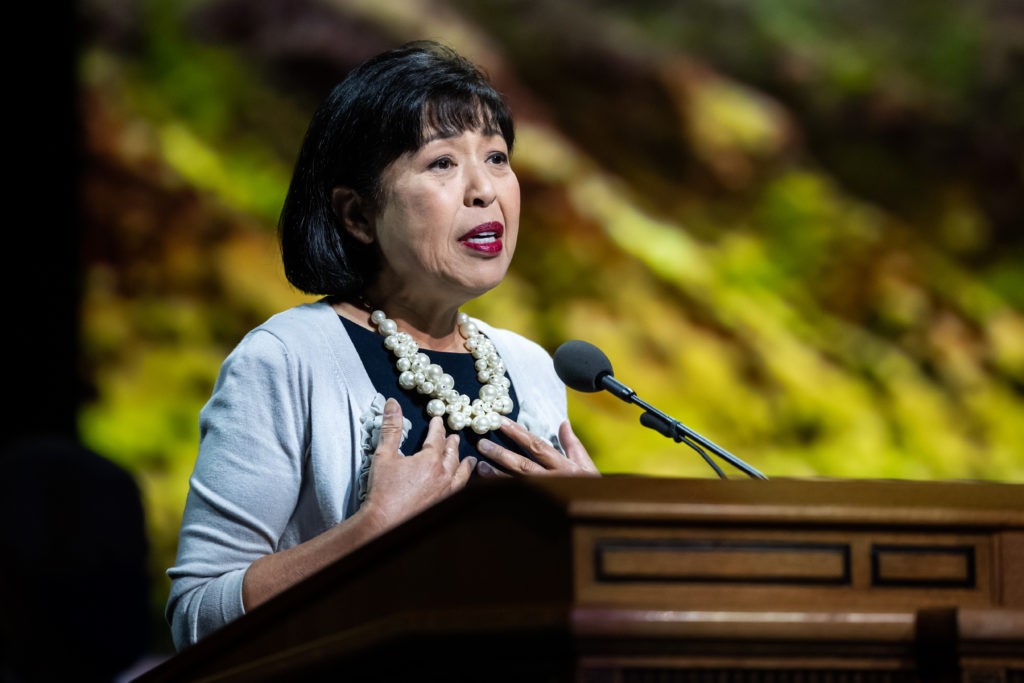
BYU psychology professor Niwako Yamawaki shared her conversion and immigration story during her devotional address on May 4.
Yamawaki shared various stories filled with pain that she has encountered on her journey to God. She said she finds Jesus Christ and God’s love in the pain she has endured and that through service people can find joy.
“As The Lord Himself told us, in the service of others, and in taking up our own crosses of suffering, we will find our own selves,” she said.
Yamawaki told the limited Marriott Center audience how she grew up in a small fishing village in Japan and was impressed upon by an American missionary.
Even though Yamawaki was unfamiliar with God due to the predominantly non-Christian community, she said the missionary’s selfless service made her feel God’s love. He struggled to pay for his own food expenses and tragically had to endure his father’s death while miles away in Japan, but the missionary dutifully kept serving and teaching the gospel.
She said she could see that the missionary “didn’t just talk about God’s love, he lived it.”
This experience started her journey to God.
After she was baptized, Yamawaki served as a branch missionary where she experienced a new understanding of God. An investigator she was working with was excited to be baptized and eventually do a baptism in the temple for his deceased mother. Another sister in the branch, however, told him his mother could not be baptized because she had committed suicide. The investigator then stopped pursuing baptism after hearing this news.
Yamawaki was devastated for this investigator and sought answers for herself about suicide in the Church. She found a General Conference talk that helped her understand the answer is not clear, but the Lord will judge the intentions of someone’s actions and that the effect of mental illness is also taken into account.
From this, Yamawaki said she learned “that practicing mercy, while withholding judgment and criticism of others, is the best way for me to serve others and be close to God.”
Yamawaki felt the Spirit call to her and tell her to move to America. This move was difficult for her as she suddenly felt unloved and “less than special.” She struggled to feel valuable and welcome while at college.
“No matter how much I worked, I felt like just a token minority and sometimes even a completely invisible person. I lost my confidence and self-worth and felt as if even God might not care about me since other people thought that I was nothing,” she said.
She pushed through college, graduated in a doctoral counseling psychology program and became a licensed psychologist.
“My pain as an immigrant has made me who I am today. I know for sure that I can
keep pushing forward on my journey because I know that God lives, and that God loves me,” she said.
Yamawaki struggled to find positives in the pain and suffering she saw in the “abused children of God” she offered counseling for at the Salt Lake County Jail. She said while it was easy for her to practice mercy and be empathetic towards victims, she found it “nearly impossible” to believe God also loves the perpetrators of abuse.
She said she came to a realization that Jesus didn’t just come for the righteous, he came for everyone, which included perpetrators of abuse.
“In the end, the Lord will make things right for both victims and perpetrators,” she said.
Yamawaki also served at a Salt Lake City shelter for women where she helped many victims of domestic abuse. This experience, and one immigrant woman’s story especially, fueled Yamawaki’s passion to research domestic violence, find ways to assist the victims and figure out how to stop it. She wanted to serve the community and particularly help other immigrants as well.
“I have felt their pain, and I have suffered with them. During this painful time, somehow, I think about Jesus,” she said.
As a BYU psychology professor, Yamawaki said she has heard various stories from students about their struggles and pain. She said she has realized that Jesus has suffered the same pain as each person in every story. She said the scars on Jesus’ hands is proof He has suffered as well.
“Even though He was resurrected and has a perfect body, He decided to keep his scars. I think this is because he wanted to show that He is the Savior. Our savior,” she said.
She believes Jesus kept the scars to show He loves every child of God so much that he was willing to suffer and “feel fully your pain and identify with each of you.”
Yamawaki tearfully testified to the audience “God exists and loves us all, no exceptions.”
She declared her journey to discover God “goes on” and her next challenge in life is to answer the question “Do I love God enough in return?”
Yamawaki insisted that even though the stories she shared may be discouraging, she is still hopeful. She sees students who are motivated to help others and relieve their pain. She knows pain and suffering will continue through life, but is confident in the future of BYU students.
“Indeed, we enter to learn, but may we more fully embrace our calling to then go forth and serve,” she said.




